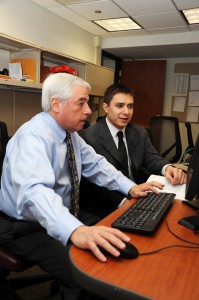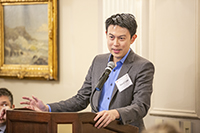
Michael Schlesinger (left), director of the Business Enterprise Law Clinic, works with student Justin Leigh on a project.
Students at The John Marshall Law School can receive more hands-on experience than ever before, as the school introduces six new clinics to its list of those already respected in local and national legal communities. The expansion is part of John Marshall’s focus on providing law students with an enriching, skills-focused learning experience.
“It’s not enough for us to expect our students to listen and learn,” said Anthony Niedwiecki, associate dean for Skills, Experiential Learning & Assessment. “We expect them to do, and to put that learning to the test before they step out of our doors.”
John Marshall’s newest clinics focus on: Business Enterprise Law, Conflict Resolution, Domestic Violence, International Human Rights, Intellectual Property and Pro Bono. They join John Marshall’s 20-year-old Fair Housing Legal Clinic, Patent Clinic and nationally renowned Veterans Legal Support Center & Clinic. Work through the Patent Clinic now will fall under the new Intellectual Property Clinic, which will also include a Trademark track.
“My time in our clinics has taught me how to work with clients and courts, and has really tested what I learned in the classroom,” said third-year law student Marcos Resendiz, who has worked in John Marshall’s fair housing and veterans clinics. “I chose John Marshall in part because of its clinical work, and it’s exciting to see that my future fellow alums will have even more options to help our community.”
Expanding its clinics not only provides John Marshall students with meaningful law school experiences, but also increases the thousands of hours of legal work students return to Chicago, Niedwiecki said.
John Marshall recently instituted a three-credit graduation requirement mandating students partake in a clinical experience or an externship sometime during their last three semesters of law school. Students can combine experiences to meet the three-credit requirement. For example, a student may earn two credits from a clinical experience, and an additional hour or two from an externship in a law office or at a government agency.
Each credit requires four hours of weekly field work, meaning that each John Marshall student provides a minimum of 168 hours of work back to the community. With a full-time enrollment of about 300, John Marshall students perform more than 50,000 hours of legal work, before they even take the bar.
“John Marshall has always been a law school dedicated to service to our community,” Dean John E. Corkery said. “Our new clinics are further proof of our commitment to providing law students an experience that will make them employable, as well as helping those most in need.”
The experiential requirement builds upon John Marshall’s nationally recognized Lawyering Skills Program, ranked No. 2 in the nation by US News and World Report’s Best Graduate Schools for two years in a row. John Marshall is the only law school in the Midwest to mandate experiential learning in order to graduate, and leads the nation in the number of credits that students take in practice-based courses and hands-on experience.

